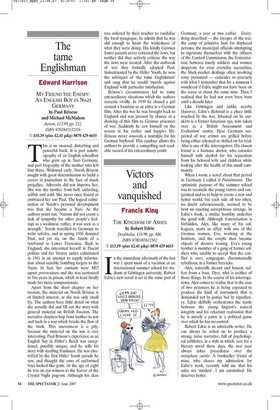Victors and vanquished
Francis King THE KINGDOM OF ASHES by Robert Edric Doubleday, £16.99, pp. 400, ISBN 9780385612562 © £13.59 (plus £2.45 p&p) 0870 429 6655 1 n the immediate aftermath of the last war I spent most of a vacation at an international summer school for students at Gottingen university. Robert Edric's new novel is set in the same part of Germany, a year or two earlier. Everything described — the ravages of the war, the camp of primitive huts for displaced persons, the municipal officials attempting to ingratiate themselves with the officers of the Control Commission, the fraternisation between lonely soldiers and women desperate for even everyday necessities, the black-market dealings often involving army personnel — coincides so precisely with what I remember that for a moment I wondered if Edric might not have been on the scene at about the same time. Then I realised that he had not even been born until a decade later.
Like Gottingen and unlike nearby Hanover, Edric's Rehstad is a place little touched by the war. Situated on its outskirts is a former luxurious spa, now taken over as a British 'Assessment and Evaluation' centre. Here Germans suspected of war crimes are grilled before being either released or shifted on for trial. Alex is one of the interrogators. His closest friend is a humane doctor, who consoles himself with alcohol for his separation from his beloved wife and children while looking after the health of this small community.
When I wrote a novel about that period in Germany I called it Punishments. The optimistic purpose of the summer school was to reconcile the young victors and vanquished and so to help to create a new and better world; but each side all too often, no doubt subconsciously, seemed to be bent on exacting surreptitious revenge. In Edric's book, a similar hostility underlies the good will. Although fraternisation is forbidden, Alex, like many of his colleagues, starts an affair with one of the German women, Eva, working at the Institute, and the couple then become objects of derisive teasing. Eva's young brother is member of a gang of former soldiers who, unable to accept that the conflict is over, congregate, discontentedly rebellious, in a former barracks.
Alex, naturally decent and honest, suffers from a boss, Dyer, who is neither of those things. In the course of his interrogations, Alex comes to realise that in the case of two prisoners he is being expected to produce the kind of assessment that is demanded not by justice but by expediency. Edric skilfully orchestrates the tussle between the young linguist's natural integrity and his reluctant realisation that he is merely a pawn in a political game over which he has no control.
Robert Edric is an admirable writer. He can always be relied on to produce a strong, tense narrative, full of psychological subtleties, in a style in which, rare for a literary novel these days, the mot juste always takes precedence over the metaphore outree. A bookseller friend of mine, who shares my admiration for Edric's work, recently told me that his sales are 'modest'. I am astonished. He deserves better.





























































 Previous page
Previous page